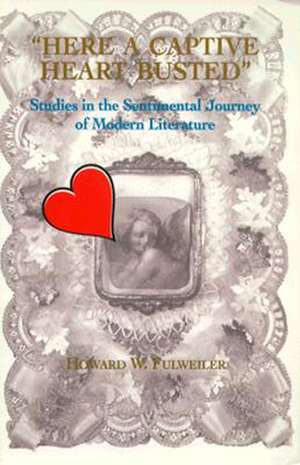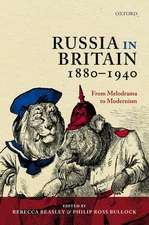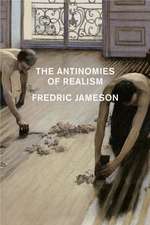Here a Captive Heart Busted – Studies in the Sentimental Journey of Modern Literature
Autor Howard Fulweileren Limba Engleză Paperback – 31 dec 1992
| Toate formatele și edițiile | Preț | Express |
|---|---|---|
| Paperback (1) | 239.88 lei 6-8 săpt. | |
| ME – Fordham University Press – 31 dec 1992 | 239.88 lei 6-8 săpt. | |
| Hardback (1) | 505.58 lei 6-8 săpt. | |
| Wiley – 31 dec 1992 | 505.58 lei 6-8 săpt. |
Preț: 239.88 lei
Nou
Puncte Express: 360
Preț estimativ în valută:
45.90€ • 48.02$ • 38.13£
45.90€ • 48.02$ • 38.13£
Carte tipărită la comandă
Livrare economică 02-16 aprilie
Preluare comenzi: 021 569.72.76
Specificații
ISBN-13: 9780823214969
ISBN-10: 0823214966
Pagini: 208
Dimensiuni: 152 x 228 x 15 mm
Greutate: 0.37 kg
Ediția:New.
Editura: ME – Fordham University Press
ISBN-10: 0823214966
Pagini: 208
Dimensiuni: 152 x 228 x 15 mm
Greutate: 0.37 kg
Ediția:New.
Editura: ME – Fordham University Press
Recenzii
"Sentimentality, defined as an "appeal to emotion which has become conventional rather than fresh, dogmatic rather than imaginative, reductive rather than enlarging," emerged in the late 18th century. It focused on the family, with women as its bedrock and children as its continuum. A reaction to the socially dissolving effects of post-Cartesian mechanism and chilling individualism, it was less apparent to 19th-century readers than to their jaded successors. Fulweiler (English, Univ. of Missouri, Columbia) traces the progress of sentimentality in key works of Tennyson, Dickens, Hopkins, Hardy, Lawrence, and Eliot. He shows how sentimentality ranges from overplaying the loss of children or the fall of women to romanticizing sexuality itself and blood ties to ancient ritual."
Notă biografică
Howard W. Fulweiler is Professor of English at the University of Missouri-Columbia.
Textul de pe ultima copertă
Seeming to stand as a wall between the nineteenth and twentieth centuries, sentimentality is almost a defining characteristic of the greatest literary figures of the former. But reflection reveals that sentimentality is perhaps the most common of all literary modes of the twentieth century as well, disguised in the latter case by an intense obsession with sexuality. This book attempts to understand sentimentality as an important event in the developing history of Western consciousness, the state of which still parallels the condition of Mark Twain's Jim (in Huckberry Finn), imprisoned in a flimsy slave cabin of false sentiment: "Here a captive heart busted". The author traces this sentimental journey of modern literature by focusing on six major writers - Tennyson and Dickens as the giants of Victorian domestic sentimentality, Hopkins and Hardy as transitional figures in whom the sentimental tropes of the nineteenth century are moving toward the sexual sentimentality of the twentieth, Lawrence and Eliot as representatives in different ways of the sexual sentimentality of the twentieth century. The hypothesis of the book is that the general consciousness of Western society has undergone severe shocks as a result of the loss - and sometimes repression - of an older human awareness of what anthropologists have called "participation", a term which may be defined as a non-sensory link between human beings and nature. This loss of participation has become gradually apparent with the erosion of its visible emblems: the Church (with its supporting intellectual bulwark of the divine origin and purposes of Natural Law); the extended family, as visualized in feudal, hierarchical theories ofsociety; and finally the nineteenth-century ideal, the nuclear family, with its sacred location, the Home, and its glorified Proprietress, the Woman. The argument grows out of the work of philosophers like Ernst Cassirer and Susanne Langer, anthropologists like Mircea Eliade and Lucien Levy-Bruhl, historical philosophers like R. G. Collingwood, Thomas Kuhn, and Michel Foucault, historically oriented literary critics like Erich Auerbach, and finally the eclectic writing of Owen Barfield. The book closes with a brief epilogue, which focuses on Toni Morrison's Beloved, a fascinating apotheosis of earlier sentimental themes. The conflict between "belonging" and "freedom" and between "head" and "heart" continues in the twentieth century, as it grew out of the nineteenth. Finally, the author calls for exchanging the literature of sentimentality for a literature of freedom, truth, and feeling, a literature which may serve as an underground railroad for Western consciousness to begin its escape from the slavery of sentimentality to find a real knowledge of the heart.













